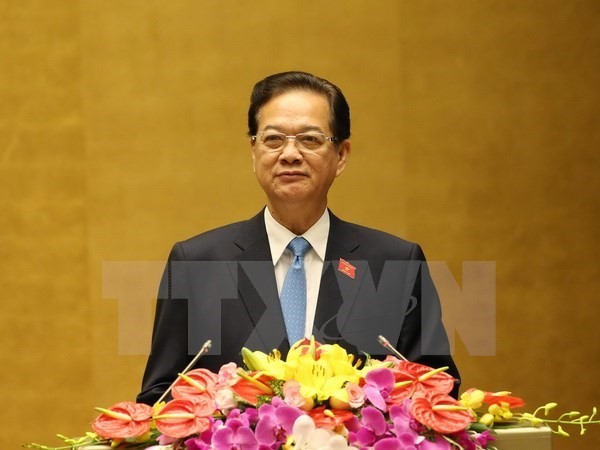(VOVworld)- Prime Minister Nguyen Tan Dung reported on the government’s performance and his own during the 2011 – 2016 term to the National Assembly deputies at the ongoing last meeting of the 13th parliament on March 22. The deputies praised the government for its great effort and flexible socio-economic management to achieve and surpass targets set by the NA. The achievements are important prerequisites for the government to fulfill its tasks in the next tenure.

Prime Minister Nguyen Tan Dung delivers the report on the Government’s and his performance (Photo: VNA) |
Managing to overcome difficulties
Tran Ngoc Vinh, a deputy for Hai Phong says the Vietnamese government put in place timely solutions to boost national economic growth amidst regional and global economic difficulties. In 2015, Vietnam surpassed the GDP growth target set by the National Assembly. The government managed to control inflation, stabilize the macro-economy, mobilize resources to invest in the people, and ensure social security. Sharing Vinh’s view, Tran Hoang Ngan, a deputy for HCM City, said: “I praise the government’s response to the Constitution, Law, and National Assembly resolutions. At the beginning of this tenure, the National Assembly adopted a resolution on ensuring social security, controlling inflation, stabilizing the macro-economy and achieving appropriate economic growth. In the last five years, the government has implemented the resolution effectively. Vietnam’s macro-economy was stabilized, major economic balances were ensured, and the import surplus was reduced from 10% to 2% of the total export value. Vietnam reported surplus exports in 2012, 2013, and 2014”.
According to Mr. Bui Duc Thu, a deputy for Lai Chau province, the government made prompt recommendations to the NA in response to any changes. Vietnam went from focusing on economic growth to stabilizing the macro-economy, adjusted state revenue collection, revised tax laws to stimulate economic growth, and strengthened administrative reform. Mr. Thu said: “The government reformed its management and strengthened administrative reforms, especially in the tax, customs, and social insurance sectors. It’s important to expand administrative reforms in other areas of society”.
Duong Trung Quoc, a deputy for Dong Nai province, said the government’s report pointed out strength, weakness, and lessons for the next tenure. He said in the last 5 years, Vietnam managed to overcome economic difficulties and deal with East-Sea-related issues: “The government managed to overcome difficulties and prove its ability to deal with and respond to changes to make its management more sustainable”.
Fine-tuning social security policy
The NA deputies praised the government’s implementation of the NA resolution on ensuring social security. The government improved the labor market, set unemployment insurance and minimum wage levels for each region, and fine-tuned social security policies.
Government’s prerequisites for the next tenure
According to the NA, lessons learned from this tenure will help the government in the next tenure work out practical solutions to further Vietnam’s development and ensure national independence, social security, law and order. Thao Xuan Sung is a deputy for Son La province: “I hope the new government will draw lessons from this report, improve its management and move closer to the people. This is how the government institutionalizes Party guidelines and NA resolutions”.
The achievements of the government and the Prime Minister in the last five years were reflected in remarkable growth. These achievements have created strong momentum for Vietnam’s sustainable growth going forward.